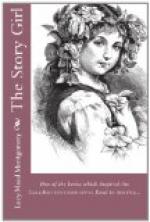But Peter must have a cent. Felicity would have given him one herself—and she was none too lavish of her coppers—rather than have him go without one. Dan, however, lent him one, on the distinct understanding that it was to be repaid the next week.
Uncle Roger wandered by at this moment and, beholding Peter, said,
“‘Is Saul also among the prophets?’ What can have induced you to turn church-goer, Peter, when all Olivia’s gentle persuasions were of no avail? The old, old argument I suppose—’beauty draws us with a single hair.’”
Uncle Roger looked quizzically at Felicity. We did not know what his quotations meant, but we understood he thought Peter was going to church because of Felicity. Felicity tossed her head.
“It isn’t my fault that he’s going to church,” she said snappishly. “It’s the Story Girl’s doings.”
Uncle Roger sat down on the doorstep, and gave himself over to one of the silent, inward paroxysms of laughter we all found so very aggravating. He shook his big, blond head, shut his eyes, and murmured,
“Not her fault! Oh, Felicity, Felicity, you’ll be the death of your dear Uncle yet if you don’t watch out.”
Felicity started off indignantly, and we followed, picking up Sara Ray at the foot of the hill.
The Carlisle church was a very old-fashioned one, with a square, ivy-hung tower. It was shaded by tall elms, and the graveyard surrounded it completely, many of the graves being directly under its windows. We always took the corner path through it, passing the King plot where our kindred of four generations slept in a green solitude of wavering light and shadow.
There was Great-grandfather King’s flat tombstone of rough Island sandstone, so overgrown with ivy that we could hardly read its lengthy inscription, recording his whole history in brief, and finishing with eight lines of original verse composed by his widow. I do not think that poetry was Great-grandmother King’s strong point. When Felix read it, on our first Sunday in Carlisle, he remarked dubiously that it looked like poetry but didn’t sound like it.
There, too, slept the Emily whose faithful spirit was supposed to haunt the orchard; but Edith who had kissed the poet lay not with her kindred. She had died in a far, foreign land, and the murmur of an alien sea sounded about her grave.
White marble tablets, ornamented with weeping willow trees, marked where Grandfather and Grandmother King were buried, and a single shaft of red Scotch granite stood between the graves of Aunt Felicity and Uncle Felix. The Story Girl lingered to lay a bunch of wild violets, misty blue and faintly sweet, on her mother’s grave; and then she read aloud the verse on the stone.
“’They were lovely and pleasant in their lives and in their death they were not divided.’”
The tones of her voice brought out the poignant and immortal beauty and pathos of that wonderful old lament. The girls wiped their eyes; and we boys felt as if we might have done so, too, had nobody been looking. What better epitaph could any one wish than to have it said that he was lovely and pleasant in his life? When I heard the Story Girl read it I made a secret compact with myself that I would try to deserve such an epitaph.




